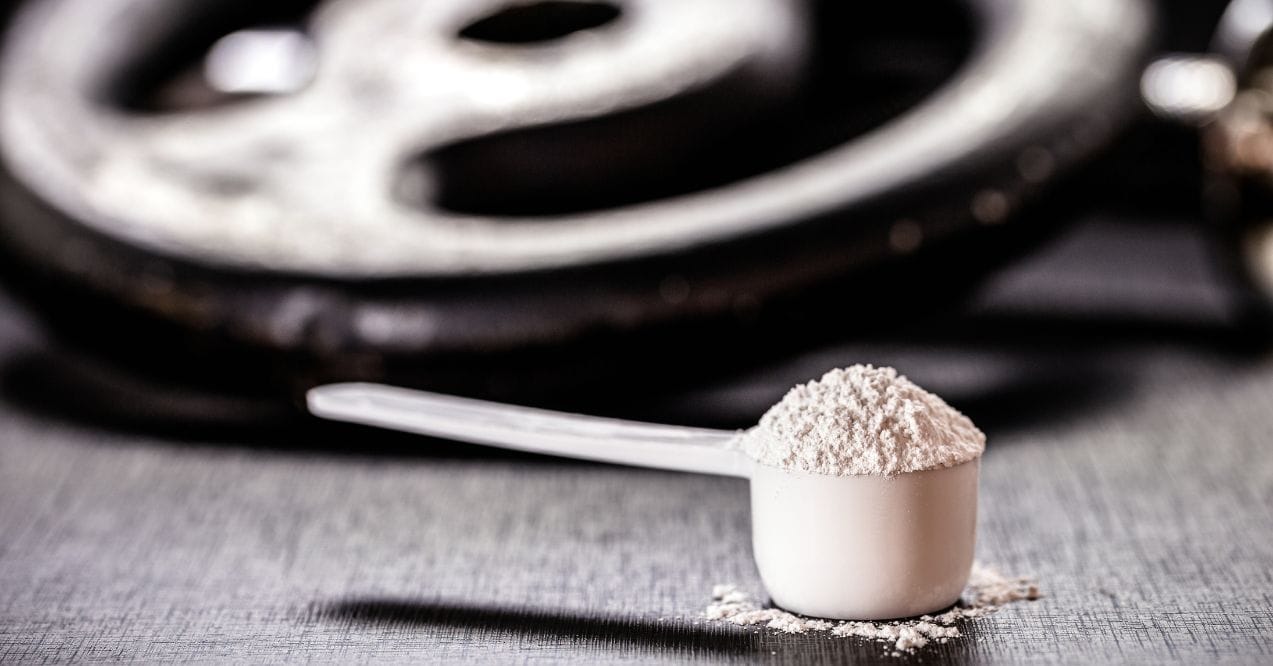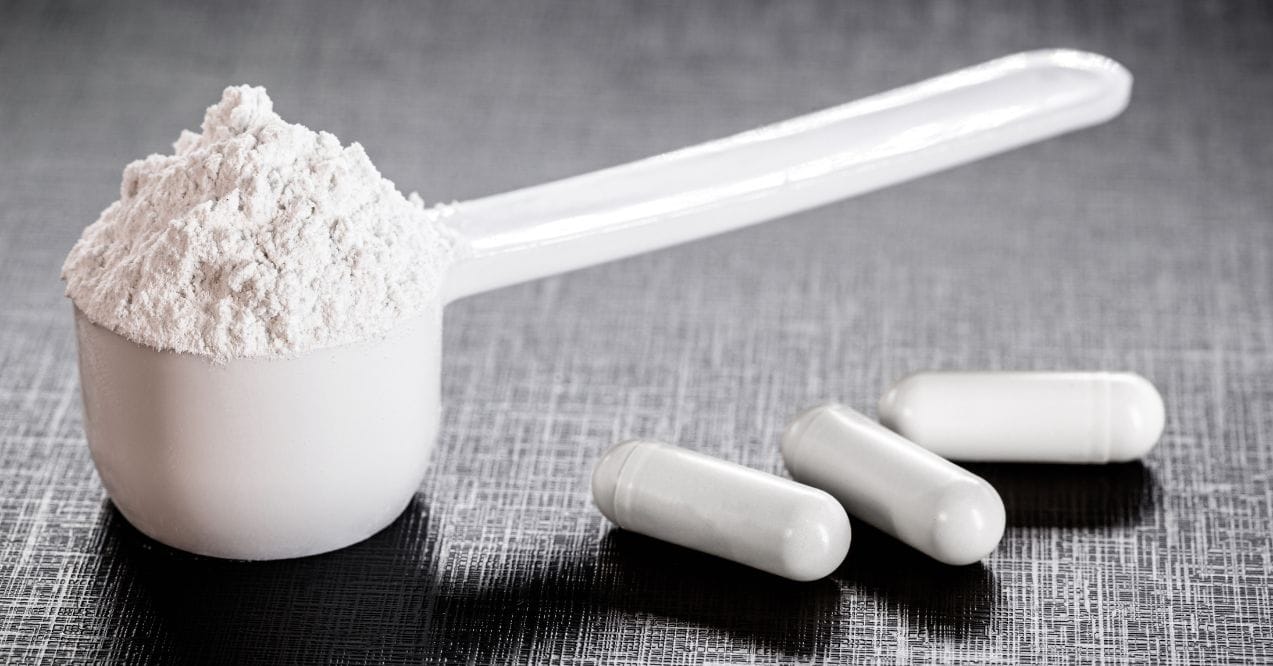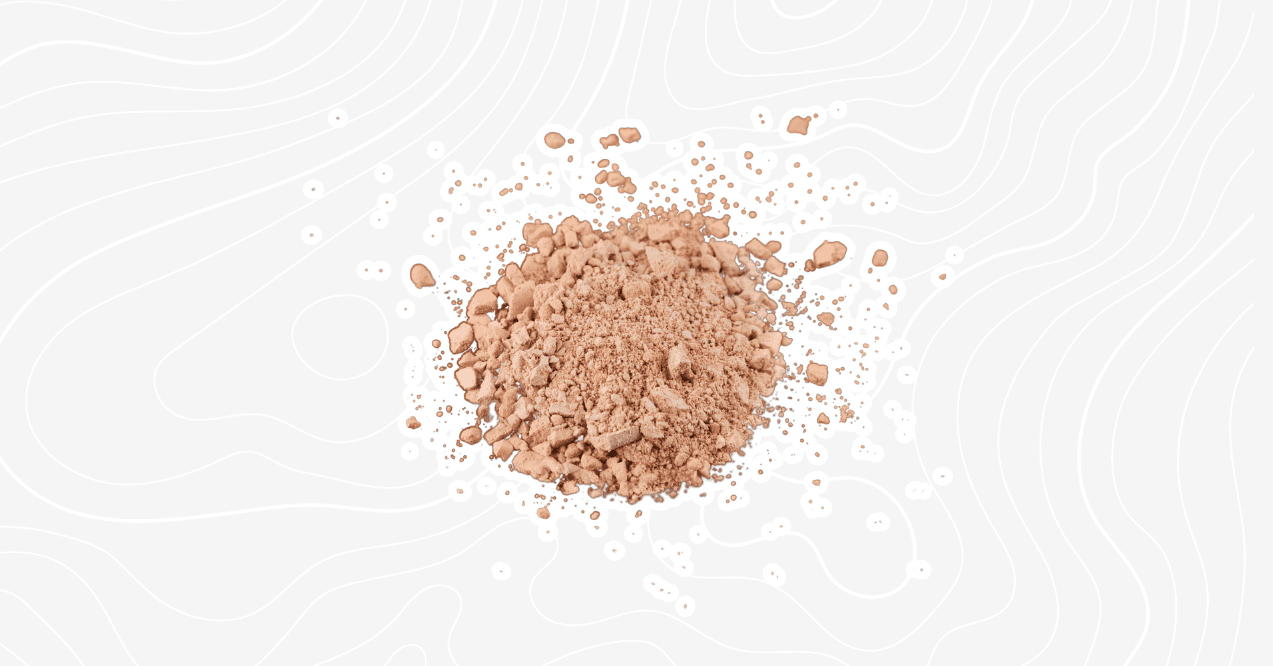How Long Does Pre-Workout Last?
The question: “How long does pre-workout last? Does pre workout expire?” resonates strongly within the fitness community, reflecting the growing popularity of pre-workout supplements among athletes and fitness enthusiasts. These supplements are now seen as critical tools designed to boost energy, enhance focus, and improve exercise performance.
In this comprehensive guide, we explore the realm of pre-workout supplements, examining their ingredients and safety considerations. A key concern for many is whether these supplements are linked to skin issues, specifically addressing the question: “Does pre-workout cause acne?” We also delve into the primary reason many of you are reading this article—the duration of pre-workout effects.
For those looking to maximize their workout efficiency, understanding how long these pre workout supplements last is crucial. The core purpose of pre-workouts is to prepare you better for the main workout session that follows. By thoroughly understanding these products, you can aim for peak performance and achieve your fitness goals. Additionally, knowing what to look for in pre-workout supplements can help you choose the right product tailored to your specific needs and avoid potential side effects. This article aims to provide clear and insightful information about pre-workout supplements, helping you make informed decisions about incorporating them into your exercise routines.
Key findings:

What Is Pre-Workout?
Pre-workout supplements are concoctions of various ingredients geared towards delivering nutrients to muscles, amplifying energy, and improving performance. The fitness community casually refers to them as “pre-workout.” Curious about the components and how does pre-workout feel like? Let’s dive in!
What to look for in pre workout? In pre-workout supplements, you should find some caffeine which elevates alertness and concentration, transforming you into a workout superhero. However, bear in mind that excess amounts can induce jitteriness.
Shifting focus to amino acids, the essential building blocks of proteins crucial for muscle growth and regeneration. Certain pre-workouts feature L-tyrosine, an amino acid that heightens focus and alleviates stress impact, enhancing endurance and overall performance.
Now, onto β-alanine, a handy accomplice that fosters carnosine production, thereby enhancing muscular endurance. When aiming for an additional repetition or sprint, β-alanine stands as your reliable companion.
Ever encountered hyaluronic acid? It’s not only confined to skincare! This compound aids in retaining body water, ensuring supple, hydrated skin. While not a prevalent pre-workout ingredient, some studies suggest potential improvements in joint function.
Last but not least, B vitamins take the spotlight. Acting as energy powerhouses, they convert food into energy and facilitate nutrient transport throughout the body, playing a pivotal role in sustaining energy levels during workouts.
Is Taking Pre-Workout Safe?
Similar to several other supplements, the question of safety and “how long does pre-workout last” is vital. In truth, the safety of pre-workouts depends on dosage. One must follow the recommended intake to the letter. But let’s break it down, shall we?
Caffeine, a significant element in many pre-workouts, serves as a double-edged sword. While heightening alertness and concentration, excessive amounts may induce jitteriness, sleep problems, and an increased heart rate.. Maintaining a moderate caffeine intake of 200-400 milligrams per day is safe for most individuals. Users must remain mindful of their caffeine consumption, considering the supplements they take and other dietary sources.
Amino acids, especially L-tyrosine, enhance focus and reduce the impact of stress on the body. However, maintaining an optimal dosage is crucial, as excessive amounts may lead to adverse effects. Hitting a balance between the benefits and potential risks is imperative for safe consumption.
β-alanine is generally safe for boosting muscular endurance when taken within recommended dosages. Some users, however, may experience a harmless tingling sensation known as paresthesia, which they can alleviate by dividing the intake throughout the day.
While not a prevalent pre-workout ingredient, hyaluronic acid harbors potential benefits for joint function. Limited research suggests safety, yet individuals with pre-existing medical conditions should exercise caution and talk with healthcare professionals before incorporating it into their regimen.
Essential for energy metabolism, B vitamins are generally safe within recommended levels. However, excessive intake of certain B vitamins can lead to adverse effects. Obtaining these nutrients from a balanced diet is advisable.
If necessary, you should do your supplementation in consultation with a healthcare provider. Pregnant or breastfeeding women, individuals with pre-existing medical conditions, or those sensitive to stimulants should exercise caution or consult healthcare professionals before venturing into the realm of pre-workout supplementation.
How Long Does Pre-Workout Last? Experts Answer!
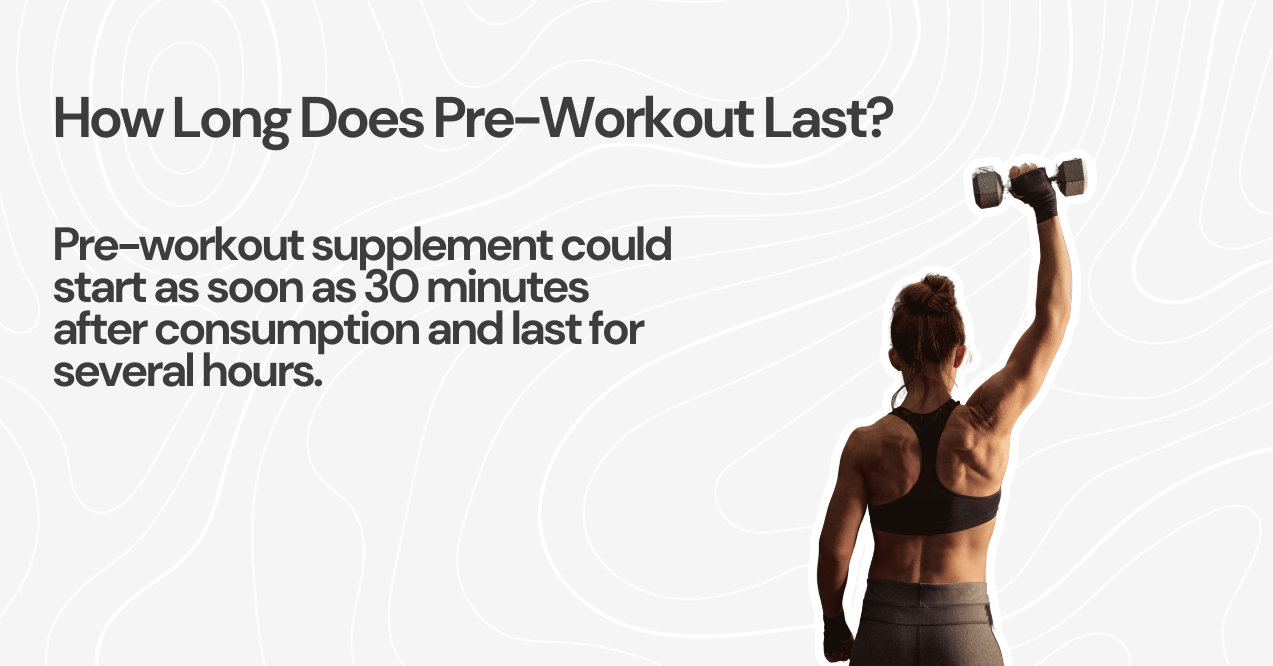
The duration and effectiveness of pre-workout supplements are highly dependent on the specific ingredients and their dosages. Considering these factors, the effects of a pre-workout supplement could start as soon as 30 minutes after consumption and last for several hours, depending on the composition of the supplement and the individual’s response. However, it’s essential to understand that these are general estimates and can differ widely among individuals.
With that in mind, let’s dive into each ingredient and the time it can last in our system during the workout.
Caffeine: The Energizer
This standout ingredient enhances alertness and focus, reaching its peak effect 1-2 hours after consumption. Its impact persists for several hours due to its approximately 5-hour half-life, ensuring sustained energy throughout your workout.
Amino Acids: Champions of Endurance
Among the leading amino acids in pre-workouts, L-tyrosine elevates focus and mitigates stress, fostering sustained endurance. Studies reveal that consistent intake over time significantly enhances overall performance, making it vital for extended training sessions.
β-Alanine: The Muscle Maestro
Renowned for boosting muscular endurance, β-alanine takes time to accumulate in your body. While immediate effects may be noticeable, its full potential only appears through regular use. Although a temporary tingling sensation (paresthesia) can occur with β-alanine, it diminishes with consistent intake.
According to Healthline’s Amy Richter, RD, pre-workout supplements are safe and do work. As the dietician puts it, you should take multi-ingredient pre-workout 30-45 minutes before exercise. The goal is to fuel your body with the perfect blend of nutrients to aid performance, reduce fatigue, and promote recovery. According to Cleveland Clinic, though, you should not take pre-workout more than once a day if you work out regularly.
Understanding the duration of pre-workout effects enables individuals to tailor their supplement intake to their specific needs and workout schedules. Those participating in early morning workouts may favor a pre-workout with a faster onset of action. Conversely, individuals with extended exercise sessions may derive benefits from formulas crafted for sustained energy release.
As you may or may not know, the duration of pre-workout effects varies based on the unique interplay of ingredients, individual metabolism, and workout routines. Caffeine’s immediate impact, amino acids’ enduring benefits, and β-alanine’s cumulative effects contribute to a nuanced timeline of pre-workout efficacy.
It is crucial to monitor individual responses, stick to recommended dosages, and check with healthcare professionals for personalized advice when using any supplement. Armed with this knowledge, fitness enthusiasts can confidently navigate the realm of pre-workout supplements to optimize their workouts for peak performance.
How Long Do Pre-workouts Take To Kick In?
As mentioned consistently throughout this text, pre-workout supplements are veritable treasure chests of meticulously selected ingredients, each chosen to elevate energy levels, focus, and endurance. But exactly when does pre-workout kick in?
Caffeine, the champion ingredient, boasts rapid action, boosting alertness and focus within 15-45 minutes. However, individual responses are as varied as the physiques sculpted in the gym, influenced by factors like metabolism, tolerance, and caffeine sensitivity.
Next, we will focus on amino acids, the building blocks of life. Their absorption is subject to the presence of food in the stomach. An empty stomach translates to faster absorption and quicker effects compared to taking pre-workout with a meal.
β-alanine, the rockstar ingredient, takes the stage for its role in improving muscular endurance. While it might not be an instant star, its benefits blossom with regular use. Though its initial performance might not be Oscar-worthy, it delivers sustained energy with consistent intake. Again, don’t be alarmed by the tingling sensation, known as paresthesia (just to remind you) — it’s a temporary side effect that fades with continued use.
Several factors influence the pre-workout curtain call. Some of them include:
- Individual Characteristics: Your metabolism, body weight, and tolerance levels are pivotal in how quickly your body absorbs and responds to these ingredients.
- Food Intake: Consuming a pre-workout supplement with or without food impacts absorption rates. An empty stomach generally leads to quicker absorption, but experiment to find what works best for you.
- Sensitivity to Ingredients: Individuals vary in their sensitivity to specific ingredients. Some may experience heightened effects due to their unique physiology.
Looking for a way to always obtain the best results? If so, to optimize your pre-workout experience, these tips are going to be your stage directions:
- Timing Is Key: Aim to take your pre-workout 15-45 minutes before your workout to coincide with the typical caffeine onset period.
- Consistency Matters: For ingredients like β-alanine that work like a marathon runner, consistent use over time is key to unlocking their full potential.
The final rep of the pre-workout journey is understanding that various factors have a bearing on its effectiveness. You can design a pre-workout routine that maximizes your performance by tuning in to your body’s response, experimenting with timing and consistency, and considering your individual characteristics.
Ultimately, uncovering the perfect kick-in time is a personal quest guided by your unique physiology and fitness goals. So, grab your shaker bottle, embrace the experimentation, and discover the formula that unlocks your full potential in the gym. Remember, the only bad workout is the one you didn’t do, and a well-timed, well-chosen pre-workout can be your key to unlocking a new level of fitness.
Benefits of Pre-Workout
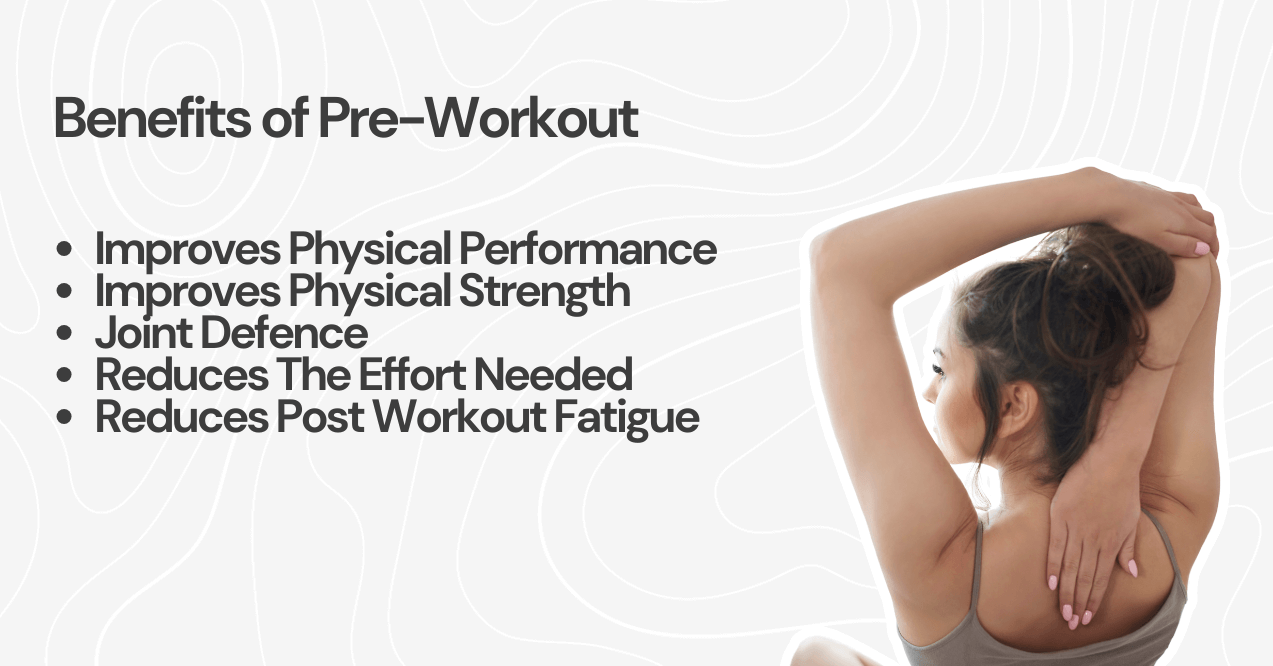
Now that we’re all on the same page regarding the safety of these energy boosters, the next step is to delve into the benefits of said supplements. The following are the reasons why you should consider implementing pre-workouts into your fitness routine.
Improves Physical Performance
Pre-workout supplements elevate physical performance actively. The common ingredient, caffeine, stimulates the central nervous system, heightens alertness, and diminishes perceived effort during exercise. This results in heightened energy levels and improved endurance, ensuring that your workout sessions are more sustained and impactful.
Caffeine enhances this performance by actively blocking adenosine receptors, preventing fatigue, and enabling longer exertion. This active process allows you to experience heightened physical performance, push your limits, and accomplish more in each workout session.
Improves Physical Strength
Incorporating pre-workout supplements into your routine actively enhances physical strength. β-alanine, a key ingredient in many supplements, actively buffers lactic acid buildup in muscles. This actively delays muscle fatigue, facilitates longer and stronger exertion, and improves strength gains over time.
Creatine can work alongside β-alanine to contribute to strength gains by boosting the body’s production of ATP, the primary energy source for cells. With more ATP actively available, your muscles can exert more force, actively improving strength and power output.
Reduces the Effort Needed
Pre-workout supplements actively reduce the perceived effort during workouts. Caffeine actively enhances adrenaline release, making physical activity feel more manageable. This active reduction in perceived effort can increase training intensity and help you achieve greater gains.
Citrulline and arginine are active nitric oxide boosters that increase blood flow to working muscles. This extra flow improves nutrient and oxygen delivery to muscles, reducing the effort needed for sustained performance and improving endurance and efficiency during workouts.
Joint Defense
Certain pre-workout ingredients actively preserve joints. Supplements with hyaluronic acid improve joint function by promoting joint lubrication and reducing friction. This improvement enhances joint health and provides a defensive strategy during intense workouts.
Collagen peptides, increasingly popular in pre-workout supplements, actively support joint health. Collagen, a key component of connective tissues, provides structural support to joints, tendons, and ligaments. Including it in pre-workouts reduces the risk of injury and supports joint resilience, which is especially crucial for high-impact activities.
Improves Workout Focus
Pre-workout supplements actively enhance both the mental and physical aspects of a workout. Amino acids, especially L-tyrosine, improve cognitive function and reduce the body’s stress impact. Using these supplements enhances mental clarity and focus, helping you engage more effectively in your workouts and making each movement intentional and purposeful.
Other cognitive-enhancing ingredients like acetyl-L-carnitine and taurine actively improve focus and mental sharpness. These ingredients affect neurotransmitter levels in the brain, promoting heightened alertness and concentration. This active approach lets you tackle your workouts with a clearer mindset, maximizing each exercise’s effectiveness.
Reduces Post Workout Fatigue
Post-workout fatigue can be a formidable adversary on your fitness journey, hindering consistency and progress. Pre-workout supplements with powerful B vitamins are always ready to combat this challenge. These vital vitamins play a crucial role in energy metabolism, facilitating the efficient conversion of food into energy. The result? Sustained energy that fuels your workouts and actively combats post-workout fatigue, allowing you to train harder and recover faster.
Among B vitamins, vitamin B12 stands out as a champion for energy production and red blood cell formation. Its inclusion in pre-workout supplements is a key resource for endurance and recovery. This approach translates to reduced post-workout fatigue, which helps you stick to your workout routine to achieve long-term fitness goals. By partnering with B vitamins, you can transform post-workout fatigue from a hurdle into a stepping stone of your fitness journey.
Possible Side Effects of Pre-Workout
While many experience enhanced performance with pre-workout supplements, users must also be mindful of potential side effects. Excessive consumption of caffeine, a crucial component, can induce jitteriness and an elevated heart rate. To steer clear of these effects, adhere strictly to recommended dosages, considering both the supplement and dietary sources of caffeine.
If you’re sensitive to stimulants or contend with pre-existing medical conditions such as cardiovascular issues, exercise caution and contemplate consulting healthcare professionals before incorporating pre-workouts. Amino acids like L-tyrosine, when overconsumed, can lead to adverse effects, underscoring the critical importance of proper dosage. As previously mentioned, β-alanine, renowned for enhancing muscular endurance, may provoke paresthesia.
Even though it’s not a common ingredient, exercise caution with hyaluronic acid if you have existing medical conditions. Consume B vitamins, generally safe, within recommended levels to forestall adverse effects. Pregnant or breastfeeding women should seek help from healthcare professionals before doing pre-workouts. By comprehending potential side effects and your own sensitivities, you can make informed decisions and tailor your pre-workout use for a safer and more effective fitness experience.

How Much Caffeine Is in a Pre-Workout?
Pre-workout supplements commonly vary in caffeine content, typically ranging from 150 to 300 milligrams per serving. Understanding these levels in the context of your overall caffeine intake is crucial. A standard cup of coffee provides about 95 milligrams, and a can of soda contains around 30 milligrams.
In comparison, pre-workouts frequently deliver a more concentrated caffeine punch. Since individual tolerance varies, it’s advisable to actively monitor your overall caffeine consumption, considering both supplement and daily dietary sources. This active approach ensures optimized performance without surpassing recommended limits, potentially preventing jitteriness or an increased heart rate.
Can I Take Pre-Workouts at Night?
Taking pre-workouts at night might affect your sleep quality. These supplements often include stimulants like caffeine, potentially disrupting your ability to fall asleep and altering sleep patterns. Caffeine, with a lasting impact on the body due to its half-life, can be particularly influential.
Consider choosing pre-workouts labeled “stimulant-free” for evening sessions or lower-caffeine alternatives. You should also monitor your tolerance levels. Experimenting with the timing and content of pre-workouts allows for a balanced approach between fitness goals and ensuring a restful night’s sleep, contributing to overall well-being.
Conclusion
As we wrap things up, we can all agree that we have exhaustively explored the composition, safety, and effects of pre-workout supplements. The key points we’ve delved into are as follows:
- Common pre-workout ingredients include caffeine, amino acids, β-alanine, hyaluronic acid, and B vitamins.
- Excess caffeine may cause jitteriness. β-alanine may induce tingling, while B vitamins are generally safe within limits.
- Caffeine peaks 1-2 hours post-consumption, lasting several hours. Amino acids provide sustained benefits, and β-alanine accumulates with consistent use.
- Excessive caffeine, amino acids, and hyaluronic acid may lead to adverse effects. β-alanine may cause temporary tingling (paresthesia). Pregnant or breastfeeding women and those with medical conditions should consult a healthcare professional before starting any pre workout supplement or exercise routine.
- Caffeine’s onset is 15-45 minutes, affected by metabolism and sensitivity. Food influences amino acids’ absorption, while β-alanine benefits unfold with consistent use.
- Typical benefits include enhanced physical performance, strength, reduced effort, joint health defense, improved focus, and reduced post-workout fatigue.
- Pre-workouts contain 150-300 milligrams of caffeine, so nighttime use may affect sleep. Stimulant-free or lower-caffeine options are better for evening sessions.
Thanks to the information outlined here, you can now make informed decisions for a safe and effective fitness journey. And if someone were to ask, “How long does pre-workout last,” we presume you’d have a comprehensive answer.
The duration pre-workout stays in your system varies, with caffeine typically peaking within 1-2 hours and lingering for several hours due to its 5-hour half-life.
Although taking pre-workout without working out is possible, its design to enhance exercise performance means its benefits may not be fully utilized during sedentary activities.
If you consume too much pre-workout, especially with excess caffeine, you may experience jitteriness and an increased heart rate. In such cases, it’s advisable to drink water, monitor symptoms, and seek medical attention if severe reactions occur.
Advertisement. This site offers health, wellness, fitness and nutritional information and is designed for educational purposes only. You should not rely on this information as a substitute for professional medical advice, diagnosis, or treatment. If you have any concerns or questions about your health, you should always consult with a physician or other health-care professional. Do not disregard, avoid or delay obtaining medical or health related advice from your health-care professional because of something you May have read on this site. The use of any information provided on this site is solely at your own risk.
Advertisement. This site offers health, wellness, fitness and nutritional information and is designed for educational purposes only. You should not rely on this information as a substitute for, nor does it replace, professional medical advice, diagnosis, or treatment. If you have any concerns or questions about your health, you should always consult with a physician or other health-care professional. Do not disregard, avoid or delay obtaining medical or health related advice from your health-care professional because of something you may have read on this site. The use of any information provided on this site is solely at your own risk.
